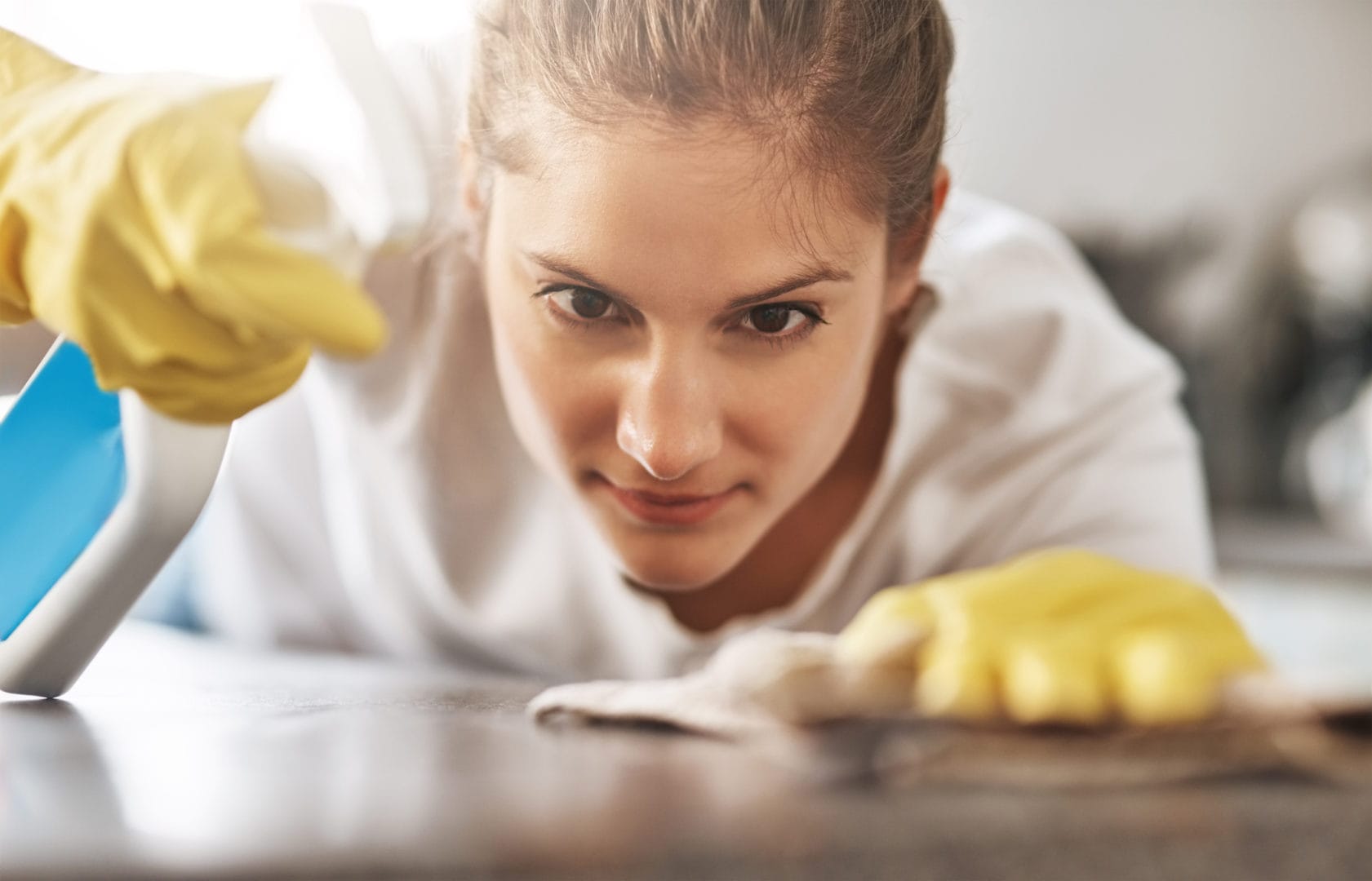Who doesn’t feel better coming home to a clean, organized, clutter-free house? If you’ve ever wondered if the stress you feel when your home isn’t as tidy as you’d like is all in your head, science assures us that it is not. The truth is, we feel more stressed out and anxious when our homes are messy. Research reveals that clutter has a negative impact on our perception of home and our subjective well-being. And one study even found an increase in depressed moods and higher levels of the stress hormone cortisol in women whose home environment was cluttered.
Keeping our homes clean and tidy is an easy way to reduce daily stress, but even the act of cleaning itself can make some of us anxious. Feeling like we don’t know where to start or how often we need to do certain household chores can stop us in our tracks. So, we asked three cleaning professionals for their best house cleaning secrets. Utilize these pro house cleaning tips to get — and keep — your home sparkling.
Have these cleaning products and tools on hand
The best way to set yourself up for cleaning success is to make sure you have the right tools for the job. The good news is that you don’t need a lot of expensive products to keep your home clean. Putting together a caddy of a few basic and reliable items is your best bet.
1. Microfiber cloths are your must-have cleaning tool
Our experts all named microfiber cloths as their favorite go-to cleaning tool.
“Not only is microfiber better at cleaning surfaces than sponges, paper towels and the like, but it’s also machine washable and quick-drying, which means they are far less likely to hold onto germs,” says Debra Johnson, home cleaning expert for Merry Maids.
Johnson says she favors pairing distilled white vinegar with microfiber cloths for surface cleaning. “Combined with water and dish liquid soap, white vinegar is your go-to multipurpose cleaner for stains and general cleaning,” she says.
Jennifer Gregory, brand manager for Molly Maid, is also a big fan of microfiber cloths.
“They eliminate up to 99% of bacteria with only water and are about three times more effective than traditional cleaning cloths,” she says. “This is why many hospitals have converted to microfiber cloths, towels and mops.”
2. Put together a cleaning caddy filled with supplies
Dawna Boone, owner of Valet Maids, also lists microfiber cloths as a must-have and adds that a glass cleaner, a mildly abrasive cleaner, an all-purpose cleaner and a pair of latex gloves are the products that you should have in your cleaning caddy before you get started.
Tips for cleaning your kitchen
The kitchen is ground zero for messes during the day, but there are simple ways to keep this room from getting the better of you.
3. Keep up with spills and mess throughout the day
“Clean as you go,” says Johnson. She recommends cleaning the kitchen daily to keep things from getting out of control. Making quick work of the daily pileup of clutter and mess will also help you avoid cross-contamination of germs.
“Keep a microfiber cloth handy,” Johnson says, “so you can immediately treat spills. That way they don’t harden and become ten times more difficult to clean later.”
4. Tackle simple tasks quickly and frequently
“Do your dishes after every meal,” says Gregory.
Like Johnson, she recommends keeping up with the daily and hourly mess that can accumulate in a kitchen to prevent having too much to handle later on. “This goes for taking out the trash, too,” she says, “As soon as it begins to brim to the top, take it out.”
The key to making kitchen-cleaning easier is remarkably simple: “Don’t procrastinate,” Gregory says.
Sweeping your floor at the end of the day and staying on top of surface messes and buildup while tidying up daily clutter will make your kitchen feel consistently clean without spending hours on it.
5. Try baking soda for cleaning tougher messes
While a microfiber cloth is perfect for quickly cleaning up small messes on kitchen counters and appliance surfaces, Boone recommends breaking out baking soda for bigger food-related messes. “Use the baking soda in your pantry for grease build up,” she says.
“Use the baking soda in your pantry for grease build up.”
—Dawna Boone, owner of Valet Maids
Sprinkle some baking soda on a cloth and wipe down any areas that have grease buildup. Give it a couple of minutes and then follow up by wiping the area with a clean, damp cloth to pick up the residue.
Tips for cleaning your bathroom
A lot goes on in your bathroom, and it’s important to keep it as germ-free as you possible. These tips will help you get control over this highly frequented room.
6. Clean highly-trafficked spots several times per week
Much like the kitchen, keeping up with your bathroom on a daily basis can make deeper, less frequent cleanings much easier.
“Tackle a small chore before it becomes a big one,” says Johnson. “I’m talking the toilet, the shower and tub and the floors. Especially behind the toilet. It’s one of the most germ-ridden areas, so you really should be cleaning it once or twice per week.”
Not convinced that you should be wiping down that toilet more frequently? Johnson explains, “Just think, every time you flush, the toilet water and waste mix together, sending plumes of microbes into the air and, in turn, all over the toilet.” Ick!
Developing consistent and simple cleaning habits in your bathroom will mean avoiding tackling a much larger mess later on. Squeegee your shower after each use to make regular weekly cleanings easier and wipe down the toilet and toothbrush holders twice a week.
7. Pay attention to smaller, often-forgotten areas in your bathroom
Gregory stresses remembering often-forgotten areas in the bathroom in order to really keep things thoroughly clean. These commonly forgotten areas can include faucet aerators and the toothbrush holder. In fact, the toothbrush holder is the third germiest place in your entire home, so you will want to make sure it’s cleaned often.
Boone also points out the importance of cleaning these areas and says using an old toothbrush with some warm water is the best way to get those nooks and crannies clean, including around your faucet.
Tips for cleaning your living room
People spend a ton of time relaxing in the living room, so you’ll want to keep it comfortable, clean and dust-free.
8. Stay on top of dust by focusing on hidden areas in your living room
The living room is the place where you, your family and any guests will spend most of your time, so you really want to do a thorough job in there. Johnson says the best way to ensure you’re hitting every spot is to move your furniture as you go. Shift everything around, so you’re vacuuming and dusting the floor underneath where the furniture sits before moving it back.
“This will ensure you’re getting those hard-to-reach places that have been collecting dust all year,” Johnson says. “And don’t forget to vacuum underneath the cushions!”
To stay ahead of the curve in your living room, you’ll want to vacuum under furniture and between cushions at least once a month. If you or a family member have allergies, do those tasks every other week.
9. Use the right tools to deal with dust
Feather dusters might look adorable, but they’re not terribly practical. In order to remove dust effectively in the living room, Boone suggests using a microfiber duster or cloth instead of a feather duster. “Feather dusters tend to just move dust around and not remove it at all,” Boone says.
10. Clean dust-collecting textiles regularly
Gregory agrees that, unlike the kitchen and bathroom, the main challenge in any living room is the dust-collecting textiles. “Regular cleaning of upholstery, carpets and linens will help reduce and control dust mite populations,” explains Gregory.
While you may not feel like cleaning those curtains or vacuuming all of your soft furniture, it’s important when it comes to keeping your home clean and your family healthy.
Curtains should be washed at least twice a year, but you can give them a light vacuuming with an attachment once a month. Regular vacuuming and dusting can be done once a week.
Tips for cleaning your bedrooms
We all want our bedrooms to feel like an oasis, but we don’t necessarily want to spend hours deep cleaning them. Checking off these easy tasks will get your bedroom in shape quickly.
11. Focus on laundering linens and pillows
Much like in the living room, keeping linens clean will be the most important task in your bedrooms. You’ll want to wipe down things like baseboards, ceiling fans and other surfaces, but Johnson points out that you and your family members spend an awful lot of time sleeping on your sheets, so keeping them clean is job number one.
“Washing your sheets weekly is more important than the rest,” she says. “It’s the best way to keep germs and allergens away — especially considering all of the hours you spend sleeping in bed throughout the week.”
Boone agrees and adds that washing your pillows in the washing machine keeps them clean and will also fluff them back up nicely after a few months of being slept on. “Be sure to use the fastest spin cycle so that as much water is wrung out as possible before putting the pillow in the dryer,” Boone says.
Even with protectors, you’ll want to wash your pillows at least twice a year.
12. Take 10 minutes a day to make your bed and tidy up
Gregory has a simple but effective tip for keeping your bedroom clutter-free and serene.
“Make your bed as soon as you get up,” she says. “It may not seem like it would make a big difference, but this is the center of your room. Having your bed made can make the whole room look tidier instantaneously. Getting in the habit of making your bed every day makes the cleaning process become ingrained in your daily routine.”
To keep your bedroom feeling like a peaceful retreat, tidy up the surfaces after making your bed in the morning. Put any clothing that has been left out into the hamper or back in your drawers. Doing these simple tasks consistently will quickly become a habit and make regular weekly cleanings much easier.
The most common cleaning mistakes
Cleaning can be tough enough without sabotaging yourself. Our experts told us the most common mistakes non-pros make when it comes to cleaning and offered simple solutions for remedying them.
13. Don’t procrastinate and put off small cleaning tasks
All of our experts agreed that procrastination is the one mistake keeping most people from maintaining a clean and tidy home. Putting off smaller tasks leads to larger, messier tasks that can seem too overwhelming. Developing a quick daily cleaning habit is the key to overcoming this common mistake. When it comes to surface cleanings, keep on top of rooms like the kitchen and bathroom on a daily basis to avoid buildup. In the bedrooms, make the beds in the morning and spend about 10 minutes once a day tidying up surfaces in the bedrooms and living room. Just those small changes will make a big difference in the way you feel about your home.
14. Don’t use the wrong tools and products
Using incorrect tools is a second mistake that is easily remedied. Make sure you have a vacuum that is equipped to clean things other than just your carpets and rugs. You’ll need one that has attachments that make it easy to clean soft furniture, curtains and stair treads. For hard surfaces, it’s a safe bet to stick with microfiber cloths and mops.
“People often make the mistake of using sponges to clean. Sponges store bacteria and are overall not sanitary,” says Boone.
“People often make the mistake of using sponges to clean. Sponges store bacteria and are overall not sanitary.”
—Dawna Boone, owner of Valet Maids
Because microfiber cloths can be laundered after each use, they’ll also save you money in the long run on cleaning supplies.
15. Delegate cleaning tasks to other people in the household
The third mistake is taking on too much yourself. If you’re feeling so overwhelmed by cleaning that you don’t get started at all, it’s time to rethink your strategy. If there are other family members living in the home, make sure everyone, including kids, is taking on their fair share of the work. Or hire a housekeeper.
“If there are children in the home, consider creating a kids chore chart,” says Gregory. “For fellow adults, divide and conquer to make weekly, monthly and larger deep cleaning tasks far more manageable.”


